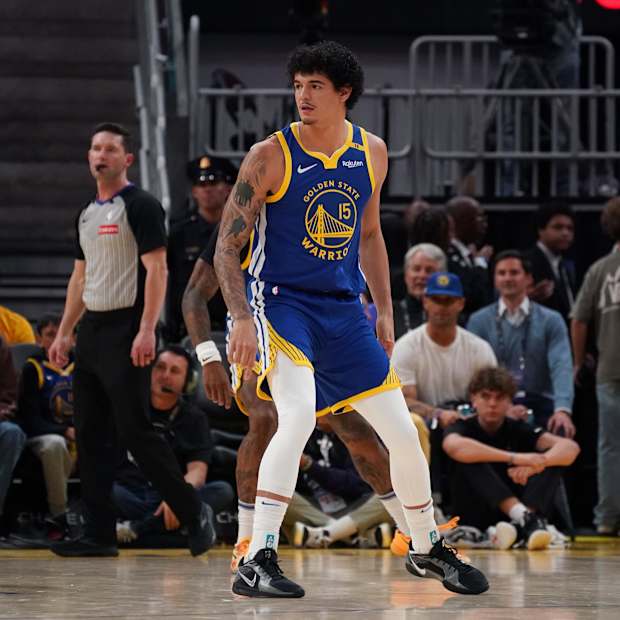
Out of this world! “Tithes and offerings” Golden State Warriors Obligated to Pay Little-Used Player After Failing to Move Contract Before Friday Deadline, Limiting Roster Flexibility…
The Golden State Warriors, a franchise known for their calculated roster-building and championship pedigree, find themselves in a challenging situation after failing to offload the contract of a little-used player before the league’s critical Friday deadline.
This misstep has not only tied up valuable salary cap space but also hindered their flexibility to make necessary roster adjustments as they seek to remain competitive in the tightly contested Western Conference.
This predicament underscores the complexities of NBA roster management, particularly for teams operating near or above the luxury tax threshold.
For the Warriors, a franchise with high expectations and a win-now mentality, every dollar counts. Retaining a player who contributes minimally on the court can have significant ramifications, both financially and strategically.
The Contract Situation
At the heart of the issue is the player’s contract, which, while not necessarily a max deal, carries enough financial weight to impact the Warriors’ overall cap structure.
The deal likely originated during a period when the player was expected to contribute more significantly. However, a combination of factors—whether a decline in performance, injuries, or simply falling out of the rotation—has rendered the player’s role marginal at best.
NBA teams face deadlines throughout the season that dictate when contracts become guaranteed or when players can be traded. Missing these deadlines often means teams are locked into paying out the full value of a contract, even if the player is no longer a key contributor.
For the Warriors, this deadline passed on Friday without a resolution, leaving them responsible for the remainder of the player’s salary.
Financial Implications
The financial impact of retaining this player cannot be overstated, especially for a team like the Warriors, which already operates under a hefty luxury tax burden.
The NBA’s luxury tax system penalizes teams that exceed the salary cap, with escalating tax rates for every dollar spent over the threshold. For a high-spending team like Golden State, even a modest contract can result in significant tax penalties.
For example, if the player’s contract is worth $5 million, the Warriors might end up paying several times that amount in luxury tax penalties.
This financial burden could limit their ability to make other moves, such as signing free agents, executing trades, or retaining key contributors when their contracts come up for renewal.
Impact on Roster Flexibility
Beyond the financial implications, retaining a little-used player also affects the Warriors’ ability to optimize their roster.
NBA teams have a finite number of roster spots, and every spot occupied by an underperforming player represents a missed opportunity to bring in someone who could make a greater impact.
The Warriors are in a unique position, with a core of seasoned veterans like Stephen Curry, Klay Thompson, and Draymond Green, complemented by younger players who are still developing.
Balancing the needs of this roster requires careful planning, particularly in terms of depth, versatility, and matchups against other top contenders. Being forced to hold onto a player who isn’t contributing at the expected level complicates this balancing act and could leave the team exposed in critical moments.
Missed Opportunities
The inability to move this player’s contract before the deadline suggests that potential trades or buyout negotiations fell through. It’s possible that the Warriors were unable to find a trade partner willing to take on the contract without requiring additional assets, such as draft picks or promising young players, to sweeten the deal.
Alternatively, the player’s performance or injury history may have made him less appealing to other teams.
Another option the Warriors may have considered is a buyout, in which the team and player agree to part ways for less than the full value of the contract.
However, buyouts can be tricky to negotiate and don’t always provide immediate cap relief, particularly for luxury tax teams.
Strategic Ramifications
For a team with championship aspirations, every decision—big or small—matters. The Warriors have long been praised for their ability to build a roster that complements their stars and maximizes their chances of success.
This situation, however, represents a rare misstep that could have ripple effects throughout the season.
One area of concern is depth. Injuries and fatigue are inevitable over the course of an 82-game season, and having reliable role players can make the difference between a deep playoff run and an early exit.
By being forced to retain a little-used player, the Warriors may have fewer options to address areas of need, such as additional scoring off the bench, defensive versatility, or rebounding.
The Road Ahead
Despite this setback, the Warriors are not without options. While the missed deadline limits their immediate flexibility, they could still explore trade opportunities closer to the trade deadline in February, when teams often become more willing to make moves as their playoff prospects come into focus.
Additionally, the Warriors’ front office has a track record of creative problem-solving and could find ways to mitigate the impact of this situation.
The player in question may also have an opportunity to change the narrative. If injuries or other circumstances lead to an expanded role, he could potentially prove his value and contribute to the team’s success.
Stranger things have happened in the NBA, and players often rise to the occasion when given a second chance.
Lessons Learned
This situation serves as a cautionary tale for NBA teams about the importance of managing contracts and roster decisions with precision. In a league where the margin for error is razor-thin, even a seemingly minor misstep can have outsized consequences.
For the Warriors, this is a reminder that even the best-run organizations are not immune to challenges.
As the season progresses, it will be interesting to see how the Warriors navigate this obstacle and whether it has any long-term impact on their pursuit of another championship.
For now, the focus will remain on making the most of their current roster and finding ways to extract value from every player, regardless of their salary or role.
The Golden State Warriors’ inability to offload the contract of a little-used player before Friday’s deadline has put them in a difficult position. The financial strain, coupled with reduced roster flexibility, poses challenges for a team that operates with championship expectations.
While this situation is far from ideal, the Warriors’ track record of resilience and resourcefulness suggests they will find a way to adapt. Still, it serves as a stark reminder of the complexities and high stakes involved in managing an NBA roster.






